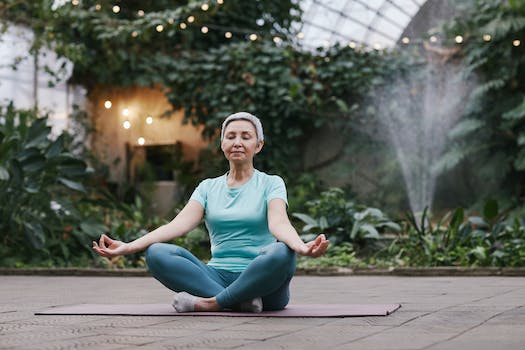Introduction: Understanding Yoga and Meditation
Welcome to our blog, “Exploring the Benefits of Yoga and Meditation for Mental Health”. In this blog, we delve into the world of yoga and meditation, two ancient practices that have been proven to boost mental health. Yoga, a physical exercise involving various body postures, breathing techniques, and meditation, harmonizes the body and mind. Meditation, on the other hand, is a practice where individuals train their mind to focus and redirect thoughts, promoting mental clarity and emotional calm. Both yoga and meditation can be powerful tools in managing stress, anxiety, and promoting overall mental well-being. Let’s embark on this journey to understand their benefits for our mental health.
The Connection Between Yoga, Meditation, and Mental Health
Yoga and meditation are powerful tools when it comes to boosting mental health. Both practices encourage deep breathing, mindfulness, and a focus on overall wellbeing. This combination helps to reduce stress, anxiety, and depression. Yoga, with its physical postures, increases body awareness and promotes relaxation. Meditation, on the other hand, allows the mind to quieten, fostering a sense of peace and mental clarity. By routinely practicing yoga and meditation, you can significantly improve your emotional health, leading to a more balanced, and positive outlook on life.
The Impact of Yoga on Stress and Anxiety
Yoga has a profound impact on stress and anxiety, making it a powerful tool for mental health. Regular practice of yoga poses, breathing exercises, and meditation can help reduce the levels of stress hormones in our body, promoting relaxation and mental calmness. It enhances our mood and overall sense of well-being. By focusing on the present moment and the movements of your body, yoga helps distract your mind from anxious thoughts. So, if you’re battling stress or anxiety, incorporating yoga into your daily routine can be a natural and effective way to manage your mental health.
Meditation for Mindfulness and Emotional Wellbeing
Meditation is a powerful tool for promoting mindfulness and emotional wellbeing. It involves focusing your mind and eliminating the stream of thoughts that may be crowding your mind and causing stress. This process results in enhanced physical and emotional well-being. When you meditate, you clear away the information overload that you build up every day, contributing to your stress. The benefits of meditation can be felt right away. Over time, meditation can help you build resilience toward stress, cultivate a positive outlook toward life, and even improve your physical health. It’s a simple and effective way to better manage your mental health and enhance your overall quality of life.
Yoga and Depression: A Healing Relationship
Yoga and depression share a unique, healing relationship. Regular yoga practice can play a significant role in reducing symptoms of depression. Yoga, with its combination of physical postures, breathing exercises, and meditation, can help to lower stress levels, enhance mood, and improve mental clarity. It encourages a strong mind-body connection, helping you to become more aware of your thoughts and feelings and thus better equipped to handle emotional challenges. In essence, yoga can be a beneficial tool in your mental health toolbox, providing a natural and holistic approach to combat depression.
How Meditation Improves Focus and Cognitive Functioning
Meditation is a powerful tool for enhancing focus and cognitive functioning. When you meditate, you train your brain to concentrate and ignore distractions, which boosts your focus in daily activities. It also improves cognitive functions by increasing grey matter in the brain associated with memory, learning, and emotion regulation. Regular meditation can reduce stress and anxiety, which are common barriers to effective cognitive functioning. Thus, incorporating meditation into your daily routine can significantly improve your mental health and cognitive abilities.
The Role of Yoga in Boosting Self-Esteem and Body Image
Yoga plays a pivotal role in enhancing self-esteem and improving body image. Regular practice of yoga asanas (poses) and meditation can help you develop a positive relationship with your body, fostering self-love and acceptance. It allows you to focus on your body’s capabilities rather than its appearance, thereby boosting your self-esteem. Moreover, yoga encourages mindfulness and reduces stress, which in turn, contributes to a positive body image. So, by incorporating yoga into your daily routine, you can cultivate self-confidence, acceptance, and a healthy body image.
Incorporating Yoga and Meditation into Your Daily Routine
Incorporating yoga and meditation into your daily routine can significantly improve your mental health. This combination of physical exercise and mindfulness practice helps to reduce stress, anxiety, and depression while increasing focus and overall happiness. Start your day with a short yoga sequence to wake up your body and clear your mind. During your lunch break or before going to bed, take a few minutes to meditate, focusing on your breath and letting go of any negative thoughts. Keep it simple and consistent, remember, even a few minutes a day can make a big difference in your mental well-being.
Personal Stories: Real-Life Experiences with Yoga and Meditation for Mental Health
In our new blog series, “Personal Stories: Real-Life Experiences with Yoga and Meditation for Mental Health”, individuals share their unique journeys of using yoga and meditation as tools for mental health enhancement. These narratives provide a closer look at how these practices have helped them reduce stress, improve focus, and foster a sense of inner peace. They highlight the transformative power of yoga and meditation in managing anxiety, depression, and other mental health issues. With these stories, we aim to inspire and encourage our readers to explore the benefits of these practices in their own lives.
Conclusion: Embracing Yoga and Meditation for Long-Term Mental Health Benefits
In conclusion, adopting yoga and meditation as part of our daily routines can significantly improve our mental health in the long run. These practices not only help reduce stress and anxiety, but they also enhance our mood, improve concentration, and promote a general sense of well-being. By consistently dedicating time to these mindful exercises, we can foster resilience against mental health issues and cultivate a more positive outlook on life. Therefore, embracing yoga and meditation is a worthwhile investment in our mental wellness.

